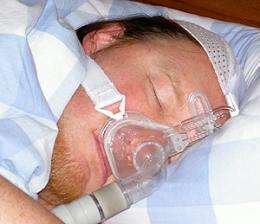Stopping snoring cuts heart attack risk

Sleep apnoea patients who are successfully treated have lower blood fat levels and a reduced risk of heart attack than people who are left untreated, University of Sydney researchers have found.
Sleep apnoea, a condition in which people stop breathing momentarily while sleeping, affects up to 20 percent of the population. The researchers found treatment with a continuous positive airway pressure (CPAP) device reduced post-meal blood fat (triglyceride) levels.
The study was conducted at the University of Sydney's NHMRC Centre for Integrated Research and Understanding of Sleep (CIRUS) and published this week in the American Journal of Respiratory and Critical Care Medicine.
The researchers investigated blood fat levels across a 24-hour period after standard meals in 38 patients with sleep apnoea. Patients were studied both before and after two months of CPAP and two months with a placebo CPAP device.
"We know that blood fat levels after meals are an important predictor of future cardiovascular disease. This research provides a possible reason why patients with sleep apnoea are at increased risk of heart attacks and strokes," said lead author Dr. Craig Phillips, who holds joint appointments with CIRUS and Royal North Shore Hospital.
"Although the results need to be confirmed in larger studies, we estimate that the extent of the improvement in triglycerides with CPAP could reduce the risk for heart attack in these patients by as much as 25 percent."
Study senior author, Professor Ron Grunstein from CIRUS, commented: "Another interesting aspect of the study was that triglyceride levels were particularly high in the middle of the night during sleep, almost seven hours after the evening meal.
"There may be an influence of the body clock that pushes up blood fat levels at these times," he said. "If this is the case, the higher rates of cardiovascular disease in night shift workers may be caused by eating high fat meals at a time when the body can't properly control blood fat levels."














